I am currently fiddeling around with the AdventureWorks sample database and LinqPad, for scratching out some ideas.
This is the query in question:
SalesOrderHeaders.GroupBy (soh => new {soh.CustomerID, soh.BillToAddressID})
.Where(soh => soh.Skip(1).Any())
.Dump();
The idea was to find duplicates based on some criteria and then display them except the first set of data. The result should be deleted from the table.
After executing the query I get result A)

After executing the query again I get Result B)

I do not care about the correct results of the query, but about the ordering of the resultset. Only those two possibilities exist and they alternate on every run of the query. Surely I could just order by Key, but I am more interested in why does this even occur? Why is the order chaning/alternating?